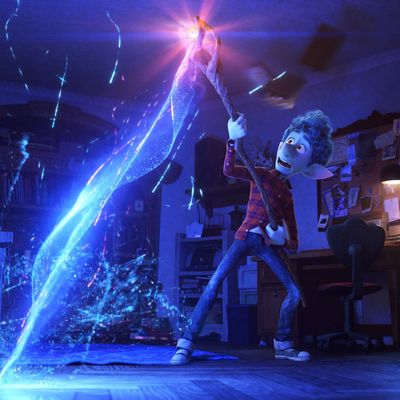
The new Pixar film Onward situates itself in a bland, mundane world that’s lost touch with the magic and mythology of the past. Literally. The characters who inhabit this universe were elves and wizards and centaurs and fawns and manticores once, and now they’re middle managers and security guards and waitresses, their powers withered through eons of disuse and the conveniences of technology. (Who needs to breathe fire when stoves exist? Who needs to gallop on four legs if they have a car?) But while the concept might be literal, the metaphor remains vague: You can see in this world’s disconnect with a glorious past whatever your personal philosophy and politics permit. Here’s a Pixar movie that even the “Make America Great Again” crowd can embrace.
Unfortunately, Onward feels like an intensely personal project that has been flattened and diluted into corporate obsequiousness. Amid its easy-to-please desperation, you can still sense the ideas that animated director Dan Scanlon (Monsters University) and even occasionally be moved by them. But it’s all somehow too much and not enough: This is a busy, but impoverished movie. By the time the Pixar-branded tears and their empty emotional calories come, you might find yourself both exhausted and wondering what the point of the whole thing was.
Our hero Ian (voiced by Tom Holland) is a shy teen elf who never got to meet his father, who died of a terminal illness many years ago. His oversize, blustery older brother Barley (a charmingly gabby Chris Pratt) only has a few memories of the old man, and seems to have checked out altogether: He spends all day immersed in a fantasy role-playing game, and won’t shut up about how all this stuff was real once upon a time. One day, mom gives the two brothers a gift that dad left behind for them to receive when they grew up. It turns out to be a magic staff that, when paired with the right spell and the right “Phoenix gem,” will bring dad back to life for one whole day. But the staff’s power is too great for them and the gem dissolves before the conjuring is complete, so they’re left with a sentient pair of legs belonging to dear old dad.
So, together, the two brothers and their half-dad embark on a quest to find another Phoenix gem (that’s right, it’s another movie with a magic stone, joining the likes of Avengers, Parasite, and Uncut Gems) so they can have their long hoped-for reunion. And of course, that requires uncovering remnants of the magical world that’s been buried beneath their current reality of suburban sprawl and postcapitalist blandness, and reconnecting with their own capacity for magic and revelation.
That’s a pretty good idea, actually, and one wonders what the live-action myth-makers of the early blockbuster era might have done with this setup: the John Boormans and Terry Gilliams and Neil Jordans of yore, and yes, maybe even the Spielbergs and Zemeckises, who, in their best work, understand our very human need for transcendence and fantasy. (And the notion of reuniting with a long-forgotten parent for one final day is actually at the heart of the shattering climax of Spielberg’s A.I. Artificial Intelligence.) Still, give Pixar credit. Onward is filled with witty, captivating designs that bring together the mundane and the otherworldly: suburban McMansions built out of giant mushrooms, gleaming office buildings shaped vaguely like medieval castles, and the climactic coup de grâce, a giant dragon built out of smoke and concrete rubble.
But the whole thing feels so preordained, so tiresome at the level of incident and character. Pratt does what he can with his slightly too-large-for-the-room energy, but Barley and Ian aren’t interesting enough to carry this story, or to make us care in any compelling way. Dad, who says nothing and only communicates blindly via his shoes, feels more real than either of the two kids who are the ostensible heroes of this story. This is a tricky concept for our times: In a world where we hadn’t had fantasy epics and hero’s journey clichés rammed down our cinematic gullets for the past 20 or so years, Onward might have felt fresher, its sentimentality tempered by an offbeat obsession with magic and chivalry and myth. But as it currently stands, this film feels like a pile of prefab story ideas occasionally enlivened by brief flashes of earnestness and invention.


